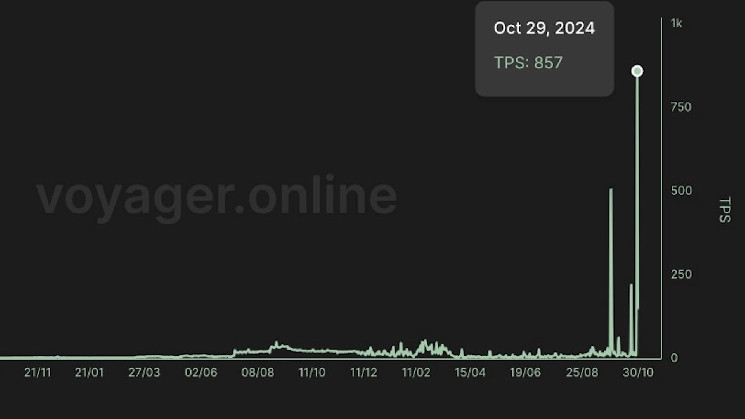Starknet, a zero-knowledge rollup, said Wednesday it had shattered the record for transactions per second (TPS) among Ethereum layer-2 networks.
According to the team, Starknet reached “a max TPS of 127.5 over the past 24 hours.”
“The milestone occurred during a gaming stress test, which was dubbed ‘dress rehearsal for mass use via L2s,'” a press release stated.
A Starknet spokesperson wrote in an email that the feat knocked Coinbase’s layer-2 network, Base, off the top spot, beating Base’s record 24-hour TPS of 79.92 TPS “by a large margin,” citing the website L2Beat.
A request for comment sent to Coinbase’s press email address wasn’t immediately returned.
Starknet is seen as one of the top teams building layer-2 networks atop Ethereum, due to its sophisticated cryptography and technical attributes – even though it ranks lower than rival projects on leaderboards of top destinations for decentralized-finance (DeFi) protocols. Its total value locked (TVL) — a measure of deposits socked into protocols on the network — currently stands at $235.7 million, according to DeFi Llama. That’s well behind Base’s $2.64 billion and Arbitrum’s $2.44 billion.
But the layer-2 projects are competing on other key metrics – including speed, interoperability and the degree of decentralization.
The latest “stress test” of the Starknet network was a joint effort between StarkWare, game development firm Cartridge and the Starknet Foundation.
‘Flippyflop’
Some 11 million daily transactions were recorded, and the peak TPS was 857, according to the team.
“The stress test was conducted with a game called ‘flippyflop,’ developed by Cartridge,” a press release stated. “The tile game saw users competing against bots to check tiles on the grid. Bots worked to undo the gamers’ work by unchecking tiles at random. As such the theme was ‘human vs. machine.’ The high pace of simple transactions generated during this game was designed to be the ultimate test for Starknet’s TPS.”
It should be noted that Starknet’s TPS test may not be an apples-to-apples test comparison versus other networks.
In other contexts, such as with zero-knowledge provers — a crucial component within many blockchain systems — there have been special efforts to conduct tests in a controlled environment.
And often there are tradeoffs – speed versus decentralization, for example.
Read more: What Are Rollups? ZK Rollups and Optimistic Rollups Explained

